Religion News Service marked its 90th anniversary in New York City on Sept. 10, with speakers and panels that drew clear parallels between the world of the 1930s and today and highlighted the role journalism can play in providing hope.
The daylong symposium and evening gala at Fordham University’s Lincoln Center campus gathered more than 150 journalists, researchers, academics, religious leaders, philanthropists and other experts who grappled with some of the most contentious issues faced by people of faith:
- Ways to depolarize churches
- The religious dynamics of authoritarianism
- Ethics around artificial intelligence
- The rise of Christian nationalism
- Interfaith work in a time of fractured alliances
The gala dinner featured a conversation between RNS national reporter Adelle Banks and legendary Boston Globe and Washington Post editor Martin Baron. He described the work of the Boston Globe “Spotlight” team who, in 2002, exposed decades of cover-ups of sexual abuse by priests in the Roman Catholic Church.
That work, ultimately depicted in the Academy Award-winning film “Spotlight,” set the stage for investigations into other abuse, he said. “It has had a significant effect on holding other institutions accountable. The Southern Baptist Convention is an example of one institution. … (The “Spotlight” work) continues to reverberate throughout the world.”

Martin Baron is interviewed by RNS national reporter Adelle Banks. (RNS photo/Ira Fox)
He said journalists must remain committed to investigative reporting and pay attention to threats to democracy, which he said are ongoing.
Americans see how fragile democracy is, he said. “We shouldn’t take anything for granted.”
How the past informs the future
Earlier in the day, attendees learned about the historical context of RNS’ founding in 1934 by journalist Louis Minsky, and the importance of religion news coverage in navigating our polarized climate.
In the late 1920s and 1930s, antisemitism was ascendant, as was anti-immigrant and anti-Catholic sentiment. Meanwhile, the modern Ku Klux Klan reemerged. In response, the National Conference of Christians and Jews formed in New York with the goal of uniting a diversifying and fracturing country. The group realized the best way to reach the public was through the media.
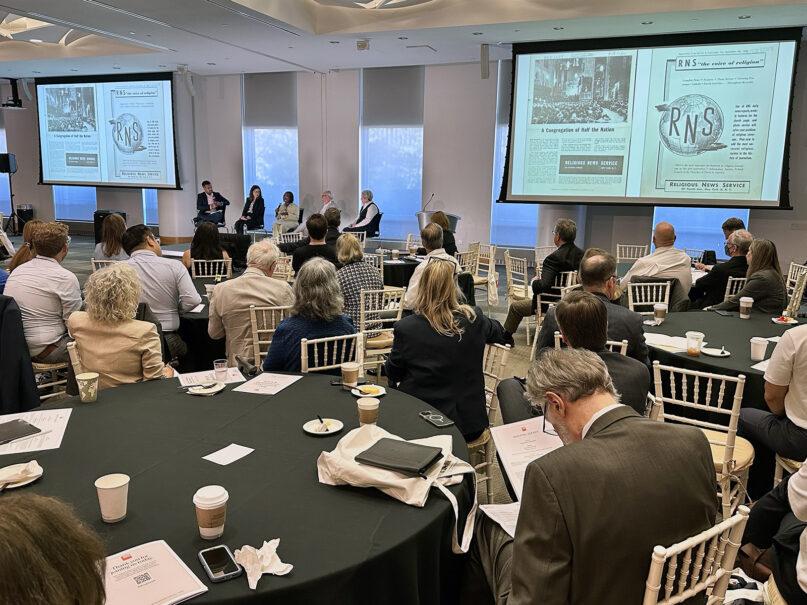
The first panel of the RNS 90th anniversary celebration kicks off a day of intriguing sessions, Sept. 10, 2024, in New York City. (RNS photo/Kit Doyle)
So when Minsky approached the NCCJ with the idea for a news service, the group backed the proposal. The NCCJ believed that if Americans could read about people of differing faiths and ethnicities, they would understand each other and be more inclined to get along.
“Louis Minsky’s insight was that journalism could educate and enlighten average people who were struggling to grasp the enormous changes happening around them. And those changes were in no small part driven by increasing religious and ethnic diversity, the same as today,” said Deborah Caldwell, who has led RNS as CEO and publisher since 2020.
Author and public speaker Wajahat Ali acted as emcee of the symposium and recounted how his immigrant father was almost deported due to bigotry. And even though he is a born-and-raised American, Ali said he became “a foreigner, a suspect” after 9/11 due to his religion and the color of his skin. He said it’s important these stories be told so bigotry and hate can be addressed.
“RNS has been telling these stories for 90 years,” Ali said.
Sister Norma Pimentel, executive director of Catholic Charities of the Rio Grande Valley, shared her experiences supporting migrants and refugees during a time when conversations around immigration policy have become highly politicized. In doing so, she brought depth and meaning to the intersection of religious life, the current immigration crisis and personal civic duty.
She described pleading to be allowed into a detention center at the U.S.-Mexico border to pray with migrant children who had been separated from their parents. Pimentel said that as children surrounded her, crying for help, she and the immigration officers were moved to tears.
After exiting the cell, the Border Patrol officers told her: “Sister, thank you. You helped us realize they’re human beings.”
This, she said, is “what we must be doing to save humanity.”
These encounters are “what is missing and what we must do to … counter the negativity and what is happening in our country, which is focusing on things that truly are not as important as who we are as people.”
Authoritarianism, Christian nationalism and the religious-political connection
But that is not so easy. And, just as in the 1920s and 1930s, immigration, multiculturalism and other societal changes create backlash.
Speakers on a panel called “The Leading Edge of Christian Nationalism” discussed a recent Pew Research Center survey that found 45% of Americans believe the U.S. should be a Christian nation, though not necessarily a theocracy. Pew Associate Director of Research Gregory A. Smith also said nearly half of Americans think the Bible should have some influence on U.S. laws.
Panelist Matthew Taylor, Protestant scholar at the Institute for Islamic, Christian and Jewish Studies, said these beliefs have evolved into more sinister ideas, primarily by a largely unknown but highly influential group called the New Apostolic Reformation.
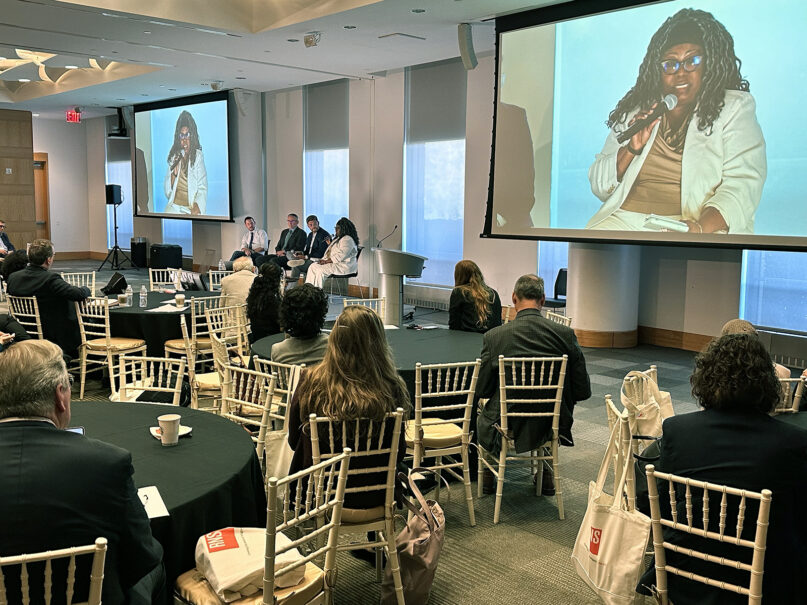
Anthea Butler participates in “The Leading Edge of Christian Nationalism” session on Sept. 10, 2024. (RNS photo/Kit Doyle)
“Within this world there’s a very strong emphasis on spiritual warfare … that gets mapped onto society and onto politics,” Taylor said. “In their world, the apostles and prophets are generals of spiritual warfare who have authority to cast out high-level demons, but who also are mobilized to organize mass campaigns of spiritual warfare.”
One of the major factors that fueled the Jan. 6, 2021, insurrection was a mass campaign of “spiritual warfare” organized by NAR, he said. Depending on what happens in the 2024 presidential election, “these folks will be ready to pivot,” Taylor warned.
Panelist Anthea Butler, a professor at the University of Pennsylvania, said it is not just conservative Protestants swayed by Christian nationalism — Catholics are part of the movement too.
She advised journalists to consider who holds authority when it comes to Catholicism and politics and to go beyond the usual stories about, for example, abortion.
“We are talking about a whole group of Latino Catholics who are willing to vote for Trump because they are hearing this (Christian nationalism) from their priest,” she said.
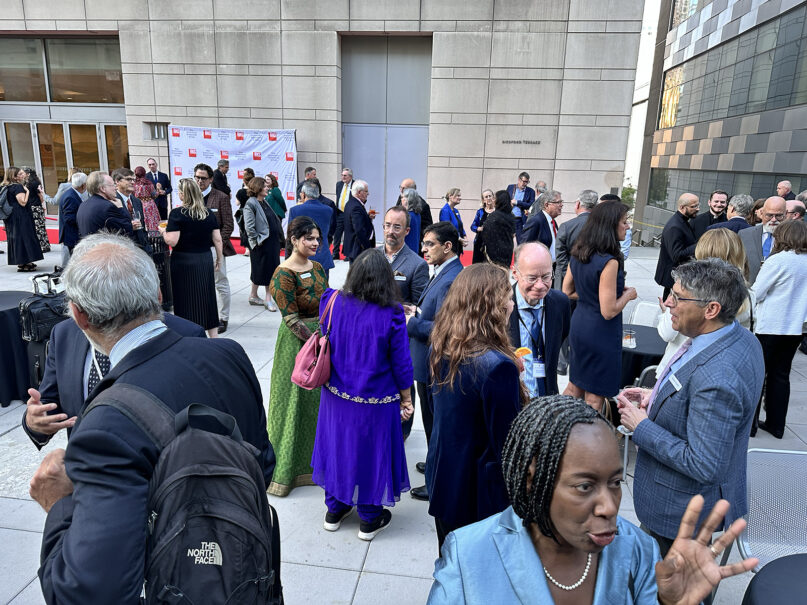
RNS 90th anniversary attendees mingle during a happy hour, Sept. 10, 2024, in New York City. (RNS photo/Kit Doyle)
The next panel of the day focused on religious dynamics and authoritarianism, with new data from a survey on the connections between Christian nationalism and authoritarianism by Public Religion Research Institute.
PRRI founder and President Robert P. Jones said that after white evangelical Protestants, it is Latino Protestants and white Catholics who are most likely to be swayed by right-wing authoritarianism. More than 75% of those who score high on the Right Wing Authoritarianism Scale believe the “final battle of good and evil is upon us, and Christians should stand firm with the full armor of God,” Jones said.
Panelist Ruth Ben-Ghiat, professor at New York University, spoke about the “authoritarian bargain” that autocrats strike with different players, with religious leaders being most important.
“The more corrupt (autocrats) are, the more violent they are, the more the need for religious legitimacy,” Ben-Ghiat said. “Once these bargains are struck, they’re very durable.
“All the (markings of the) authoritarian playbook are in the United States,” she warned.
And yet, there are Christians trying to break down barriers between those with diametrically opposed views about faith and the future of the United States.
Russell Moore, editor-in-chief of Christianity Today and previously one of the most important figures in the Southern Baptist Convention, in 2021 publicly broke with his denomination over issues of theology, politics and abuse of power. Today he is co-producer of “The After Party,” which aims to provide resources to help people of faith “approach divisive partisan issues with a biblically faithful approach.”
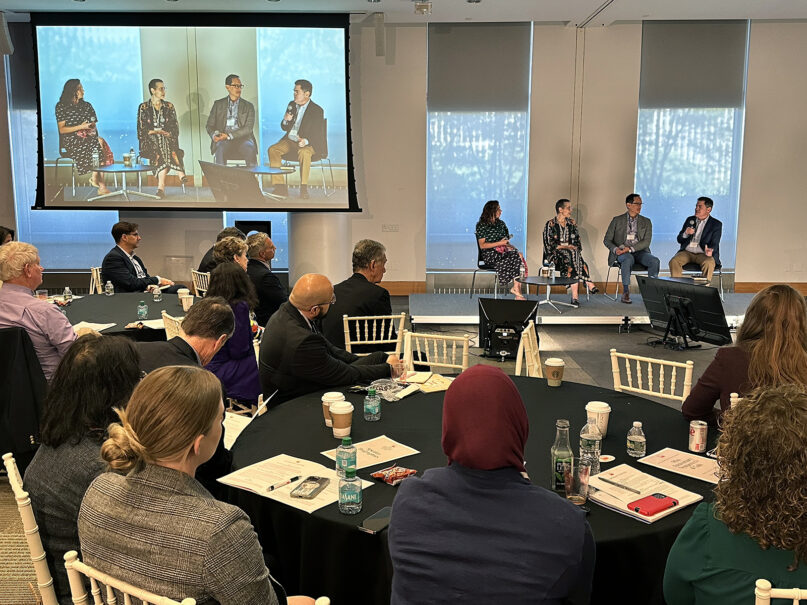
Russell Moore, top right, speaks during the session “Depolarizing Churches: Engaging Politics with Grace.” (RNS photo/Kit Doyle)
In a session on “Depolarizing Churches: Engaging Politics with Grace,” he said what we are seeing is that “not just in the church and not just in religious institutions, but in institutional life generally, there is a shaking. There are old coalitions that are falling apart, new coalitions that are starting. That is happening in almost every institution in American life right now. And that’s traumatic and painful.”
And, he said, it’s not just among evangelicals.
“Completely red congregations are divided, and completely blue congregations are divided,” Moore said. “I had within 24 hours a very conservative Bible church pastor in Texas and a very progressive Episcopal priest in Northern Virginia tell me almost the exact same story, just mirror images of each other, which is ‘our congregation all votes alike. We think alike on most things, the pastor and the congregation agree on all of that, but there’s constant conflict between what is going to be made central. And are these political affiliations going to become a part of tribal belonging?’”
Celebrity ghostwriter and former Republican adviser Nancy French said she found herself at a “crossroads” when, on the campaign airplane of former President Donald Trump, she declined to have a photo of herself taken with the candidate. “I had this moment of clarity,” she said. “I had to get out of there.”
As her thinking evolved, she said, “eventually I became so annoying to my clients because they didn’t hire me to challenge them. They hired me to write what they wanted to write, and they were right to. … I was fired or I quit all of my jobs, and I became basically unemployable.”
When she left, her evangelical community was angry at her and “I felt full of grief and lament. I’m severely wounded by this cultural moment, as probably all of us are.”
Strained interfaith dialogue and where we go from here
That pain is also evident in the interfaith world, particularly amid war in the Middle East.
A year after the Hamas attacks in Israel and the ensuing bombing campaign in Gaza, interfaith partnerships have frayed here and abroad. A panel on “Interfaith Relations in Crisis: The Path Forward When Alliances Fracture” offered advice and discussion on the deep emotions religious communities are managing — and asked if they can ever work together again.
Moderator Paul Raushenbush, president and CEO of Interfaith Alliance, acknowledged that this has been a time when “deep convictions … have led to a (sometimes) hardening of … our ability to talk with one another.”
RNS national reporter Yonat Shimron recalled that immediately after Oct. 7, 2023, American Jewish groups “locked arms with Israel” in support while two groups called for a ceasefire — Jewish Voice for Peace and If Not Now. “These two groups really knew how to put on protests,” Shimron said, which caused them to be cast aside by mainstream Jewish organizations, who called them “radical actors.”
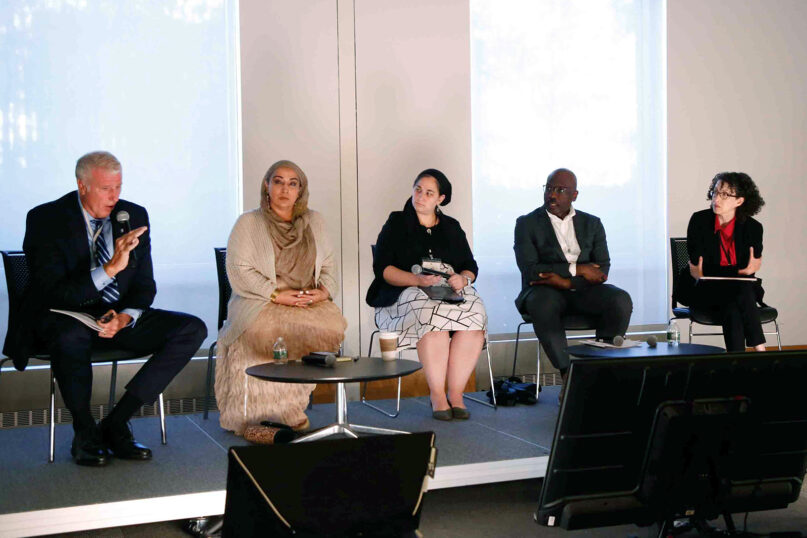
The Rev. Paul Raushenbush, left, moderates the “Interfaith Relations in Crisis: The Path Forward When Alliances Fracture” panel on Sept. 10, 2024. (RNS photo/Ira Fox)
“There was a real fracturing,” Shimron said, and it has lasted to the present. “It really has created a lot of fissures with the larger interfaith community. The work that Jews have done over the years to create alliances with Blacks and civil rights issues and interfaith groups has suffered a lot.”
Najeeba Syeed, executive director of the Interfaith Institute at Augsburg University, spoke about the impact of the last year on college campuses by offering two questions: “Who owns religion on our college campuses? Who owns religion (at all)?”
Rabba Rori Picker Neiss, senior vice president for community relations at Jewish Council for Public Affairs, said the Jewish community is still in trauma.
“For most Jews right now who I’m interacting with, they’re sitting with this conflict of how do they talk about Israel and the Israeli government and the atrocities of what they’re seeing happening to innocent children in Gaza while also holding the pain and the fear of what it meant to see the Jewish community in Israel,” Neiss said. “What’s our response supposed to be?”
Raushenbush asked the panelists for strategies that create hope.
Syeed said she has worked in a pastoral capacity with many Jewish students on campus. “We need to work against the narrative that there is an inevitability that these communities cannot coexist and have conversations.”
And indeed, they do, in different contexts.
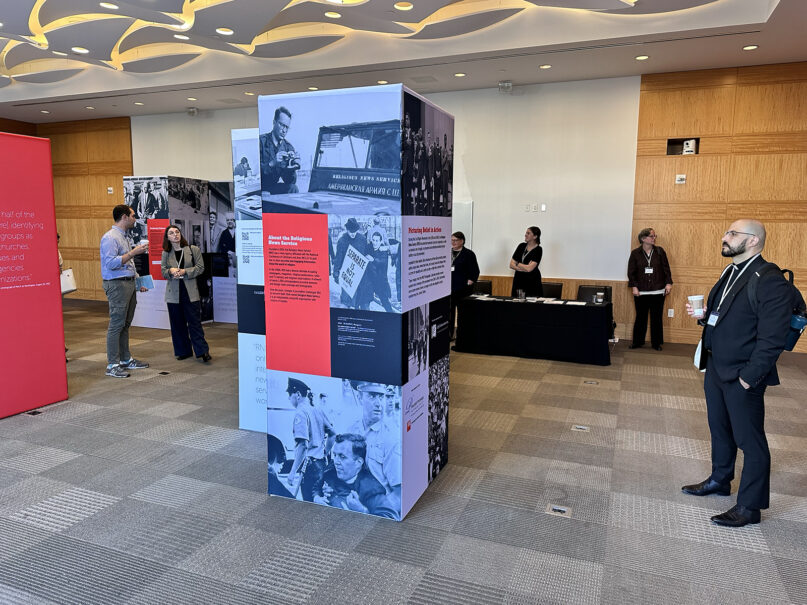
An exhibition of historic RNS photographs from the Civil Rights era that created by the Presbyterian Historical Society, which houses the RNS archives, was premiered during the 90th anniversary at Fordham University’s Lincoln Center campus. (RNS photo/Kit Doyle)
At a panel on emerging faith groups in the American mainstream of volunteerism, RNS national reporter Bob Smietana said he is seeing more cooperation among religious groups working at disaster sites. “Whatever faith you are, someone’s got to load the shelves and help people get food.”
He reminded listeners that “the genius of humanity is being interdependent,” though in recent decades religious leaders have had to work hard to remind people “this is what it means to be human. We help each other.”
And, like Sister Pimentel earlier in the day, Smietana said that as worried as we are about politics, “we should be worried equally about the collapse of communal trust. … We can worry about all this other stuff, but … we’re not thinking about (community life). And it’s right in front of us.”




